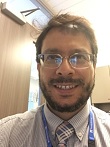Neurophysiology and Rehabilitation (ISSN: 2641-8991)
Editor


Biography
Herbert Alejandro Manosalva Alzate has completed his medical and neurology degree at the National University of Colombia. He worked in the Netherlands Antilles
for 8 years, and due to his passion for neurosciences, he moved to Canada, where he completed his Fellowship in Movement Disorders & Medical Genetics applied
to the field of movement disorders and neurology at the University of Alberta. Due to his research interest in Vascular Parkinsonism, he published a study in a novel
form of screening patients with this condition in the Stroke prevention clinic. He completed at the same university his second Fellowship in cerebrovascular diseases
before he moved to the University of Toronto in Ontario at the Sunnybrook Hospital. He is currently planning a study for patients with central retinal artery occlusion,
the condition that has no current effective treatment.
Research Interest
Vascular Parkinsonism, ,Stroke in young adults, Fabrys disease
Keywords
- Neurogenetics
- Neuroimagining
- Neurodegenerative disorders
- Neurosurgery
- Brain injury
- Parkinsons disease
- Central nervous system
- Neuroscience
- Multiple sclerosis
- Alzheimers disease
- Huntington chorea
- Neurological rehabilitation
- Neuroimmunology
- Neuroanatomy
- Neurophysiology
- Addictive behaviour
- Neurotoxicity
- Neuropharmacology
- Migraine
- Trisomy 21
- Vascular neurology
- Neuro-oncology
- Neuropsychology
- Neurosurgical anesthesiology
- Cerebral palsy
- Amyloidosis
- Trigeminal neuralgia
- Whiplash
- Drug rehabilitation
- Molecular neuroscience
- Neuroendocrinology
- Neurochemistry
- Neurogenesis
- Computational neurogenetic
- Neuronal lineage marker
- Neuroprosthetics
- Neurocardiology
- Neurogastroenterology
- Neuroepidemiology
- Neurointensive care
- Neuro-ophthalmology
- Neurolinguistics
- Neuroanthropology
- Neuromelanin
- Adie syndrome
- Angelman syndrome
- Friedreichs ataxia
- Barth syndrome
- Gaucher disease
- Sandhoff disease
- Prader–Willi syndrome
- Guillain–Barré syndrome
- Neurotrophins
- Noogenesis
- Neurulation
- Neuropathic pain
- Autism
- Signal transductions
- Asperger syndrome
- vestibular system
- Neurodiversity
- Brain–computer interface
- Neurochip
- Cultured neuronal network
- Neural circuit
- Artificial brain
- Brain mapping
- Neurogrid
- Back pain
- Meningitis
- spinal cord injury
- Sleep disorder
- Neural oscillations
- Neural engineering
- Artificial neural networks
- Neural coding
- Occupational therapists
- Picks disease
- Nerve injury
- Corticobasal syndrome
- Language delay
- Learning Disabilities
- Hydrocephalus
- Hemiparesis
- Dysautonomia
- Autoimmune encephalitis
- Cerebral vasculitis
- Sleep apnea
- Mouse models in neurological disorders
- Vascular neurosurgery
- Endovascular Neurosurgery
- Vascular Dementia
- Gait abnormality
- Frameless Stereotactic Craniotomy
- Neuroprotection
- Motor rehabilitation
- Werdnig-Hoffmann disease
- Neuroleptics
- Stem Cells in Neuroimmunology
- Neuroimmunomodulation
- Alpha-GPC
- Donepezil
- Neuropsychological tests
- Ammons Quick Test
- Beck Anxiety Inventory
- Beck Depression Inventory
- Bender Visual Motor Gestalt Test
- Boston Diagnostic Aphasia Examination
- Boston Naming Test
- Cambridge Neuropsychological Test Automated Battery
- Computerized Assessment System
- Cognitive abilities screening instrument
- Cognitive Function Scanner
- Comprehensive aphasia test
- Cognistat paper test
- Controlled Oral Word Association Test
- Aphasia
- Neurologic Music Therapy
- Central-acting agents
- Astrocyte-Neuron Interactions
- Cognitive genomics
- Lewy body dementia
- Neural decoding
- Neuromuscular junction
- Neurotechnology
- Post-polio syndrome
- Snoring
- Tourette disorder
- Wilsons disease
- Binswangers Disease
- Spinal cord tumor
- white matter lesions
- Acute Disseminated Encephalomyelitis
- Behcets Disease
- View more

